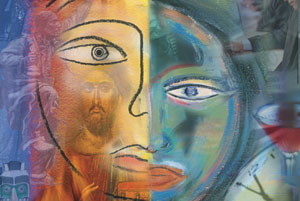
Personalities
I'm fascinated by personalities. There is nothing more diverse in this world than the complexity of unique personalities. Fingerprints and retinal scans may be distinctive, but personalities are much more diverse. And they are much more flexible and dynamic. One's personality is the totality of their behavioral and emotional characteristics. Personality is a small word that describes nothing, but refers to infinite possibilities.
A friend of mine said to me, in reference to a mutual friend, "I like his personality.” That's almost like saying, “I like the renaissance.” Both terms cover too much territory to make blanket statements like that. Yes, you can like someone's personality to the extent that you have been exposed to it. I like New Orleans, but I've never been there during a hurricane. Our mutual friend is divorced, so evidently not everyone likes his personality.
Saying someone has “no personality” is impossible unless the person doesn't exist. If you exist, you have a personality. But your personality is like the weather. It can range from lovely to unbearable. Try waking someone in the middle of the night to ask him or her a question, and see how 'lovely' it is.
There are many categorize for personalities. There are type A personalities and type B personalities. The Myers Briggs model of personality puts personalities in 16 categories, but that is based on only four preferences. I don't know about you, but I have a lot more than four preferences.
Psychologists and psychiatrists make careers out of examining and treating personality disorders. Personalities can be hyperesthetic, depressive, anesthetic, or hypomanic. They can be obsessive-compulsive, avoidant, paranoid, histrionic, passive-aggressive, depressive, masochistic, dependent, sadistic, narcissistic, antisocial, schizotypal, compensatory, narcissistic, schizoid, cyclothymic. … well, you get the idea. At least one “expert” has even gone so far as to declare that some of these are not disorders but personality “styles.”
Some people have multiple personalities and some need more personality. Others have fake personalities that, like makeup, are put on to fit the occasion. And nothing is more influenced by “the occasion” than one's personality. Personalities are situational-dependent, at the mercy of emotions, and can vary at the drop of a hat, or in response to a word. It's easy to change someone's personality just by giving them the finger.
Groups also have personalities. After teaching many years, I'm still amazed at how groups of 20 or 30 students, given the same situation (course, time and professor) can be so different. Some classes are so dead that it's like being at a funeral. Others are like being at a party. And group personalities can be categorized, although research on this is almost non-existent. There is a fuzzy and overlapping area between groups with personalities and personalities defined by groups. Group Think is where members euphorically agree with one another without critical thought, while the Abilene Paradox describes groups of people who go along with a course of action that no individual member wanted. Then there is mob mentality, party mentality, and perhaps the Republican Party.
Personality even extends to non-human phenomenon. For example, “The decor had a somber personality,” although the word ambiance is more apropos. Books, poetry, photographs, movies and restaurants can all have personalities in the broader sense of the usage.
People who have known me all my life tell me that my personality is not reflected in what I write, and that my writing belies my personality. I guess that is good, because I think I'm a really boring person to be around. Just don't wake me in the middle of the night to ask me a question.